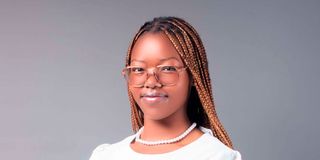Young women changing the face of varsity student politics

Adeline Chelagat Kiptoo, a third-year law student who is the third female president in the history of Kabarak University School of Law.
What you need to know:
- Young women are not just making their presence felt; they are breaking glass ceilings and reshaping the landscape.
- On Monday last week, six young women were elected to serve at the Kabarak University Law Students’ Association.
In a world where the call for diversity and inclusion resonates louder than ever, a remarkable shift is taking place in universities’ student leadership.
Young women are not just making their presence felt; they are breaking glass ceilings and reshaping the landscape.
On Monday last week, six young women were elected to serve as officials of the Kabarak University Law Students’ Association. Eight slots were up for grabs.
To top it off, the president is 20-year-old Adeline Chelagat Kiptoo. The third-year student is now in charge of a student body comprising 800 members. She is the third female president in the history of the association.
Also elected were Faith Ndubai (vice chairperson), Rita Butit (secretary), Ruth Jebet Kiplagat (moot and debate coordinator), Joan Jebiwot Kiptui (legal aid coordinator) and Joy Chebet Namuya (secretary general).
Male contestants won two positions. They were Michael Muchomba (treasurer) and Russel Crowe (journals and publications coordinator).
In an interview with Nation.Africa, Ms Kiptoo shares her election story: campaign journey, inspiration and plans for one of the largest law faculties in Kenya.
What inspired you to venture into politics and leadership?
I have a very close relationship with my mother, Caroline Jeptoo Ng'elech, who is the woman representative for Elgeyo Marakwet. Growing up, I saw how bold she was in politics. This gave me courage and inspired me to vie for a student leader position in university.
Although the strategy my mother used to get elected may not have been applicable in my case, she supported me financially and encouraged me to be confident in my leadership skills.
I held leadership positions from primary school all the way to high school. Most of my mentors such as Marion Chepkemboi, who has served as president of Kabarak Law School, encouraged me to get into student leadership. All these factors reignited my leadership spark.
How was the campaign?
Campaigning was challenging because my opponent was stronger and more popular with students. I am also quite introverted and this process made me step out of my shell.
I had to be extroverted to pull in numbers. I had to go to every class to sell my manifesto and develop a relationship with students.
For visibility, I used posters and branded pens to let everyone know that I was running for president. Besides that, I invested in a strong online presence. I had two representatives in every class WhatsApp group who would help sell my manifesto to the students.
In case their classmates had questions, I was able to address their concerns. I also made a lot of videos about my candidature that I forwarded to student groups.
Speaking of manifestos, what is your plan for Kabarak law students?
My manifesto has five pillars: academic work; student welfare; clubs and societies; Kabaranicity (the university's culture); and infrastructure.
Academic work is my major pillar. I would like to work with the administration to ensure there are no missing marks, ensure progression of students from one year to the next and form partnerships with top-tier law firms where students can intern to gain hands-on experience of legal practice.
I would also like to create a programme that will empower students to apply for scholarships. This will help them know how to prepare required documents and know the best universities for master’s programmes.
We have also begun a law firm initiative that cultivates the culture of mooting in the school. This involves training students in research, legal writing and presentation.
The students should also learn to give back to society. This is why we have established a legal aid clinic for students to work with people who cannot afford or have limited access to legal services.
What are your thoughts on women’s leadership in national politics?
Although there are fewer women than men in national politics, in the recent past, there has been an increase in the number of elected women leaders.
I believe this is a positive trend that will continue into the future.
What are your plans?
I see myself becoming an excellent lawyer. I find litigating an art and hope to grow my skills enough to develop this art and make a positive impact on the community.





